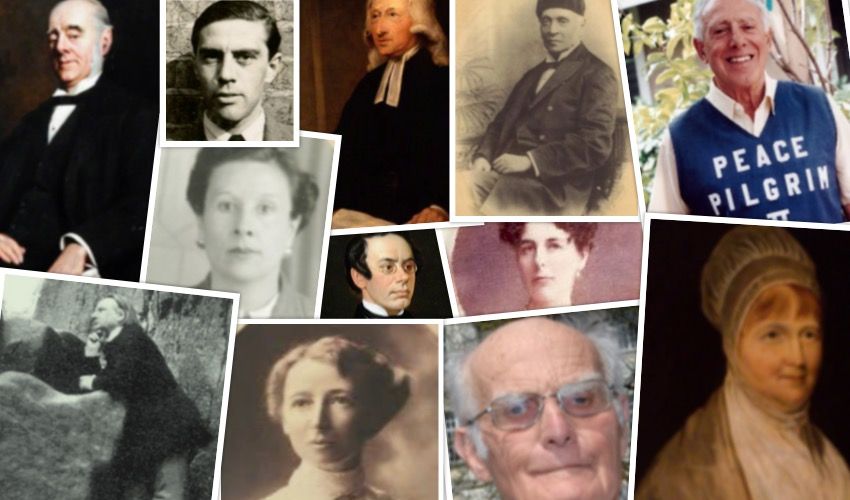

From Elizabeth Fry’s campaign for reform of the Island’s prison, to reconciliation between Jersey and its German occupiers, Jersey Heritage's latest tour highlights locations linked with stories of peace.
The Jersey Peace Trail invites islanders on a tour of St. Helier from west to east through the heart of town.
Launched to mark the centenary of the Armistice, the Trail includes 15 different stops. "It is essentially a walking guide around St. Helier," Lucy Layton, Outreach Curator at Jersey Heritage explained. "We have 15 different locations and we are exploring some of the lesser known stories of peace connected with those sites."
The idea of a Jersey Peace Trail was suggested by the local Quaker group a few years ago. Jersey Heritage took on the responsiblity of creating it and received funding from the Jersey Association of Charities and the CI Lottery for it. Ms Layton said: "When we looked into it, there are actually peace trails that have been made for many towns and cities across the UK and also around the world.
"Their idea is to take you to sort of sites and monuments in townscape and explore the lesser known stories about peace and social justice connected with those sites. We really wanted to make people walk around St. Helier and look at different plaques or monuments that may have passed while they are walking past for work or shopping and discover some of the hidden stories behind those sites."
Video: Lucy Layton explains how the Jersey Peace Trail was created.
The walking guide was developed with the help of local students. Last summer, two groups from JCG and Beaulieu spent a day at the Archive to research the stories of the different sites and of individuals along the trail. Over the next six months, Jersey Heritage worked with students from Le Rocquier, Hautlieu, Victoria College, JCG and Beaulieu who filmed a series of video clips produced to accompany the walking guide leaflet.
Joe Hills, a student from Le Rocquier, said all islanders should try and follow the Peace Trail. "I think it’s really important that we know about what happened in our own past and what’s made it how it is," he explained.
"We had a lot of discussions about what should be included or not, and what more should we explore," Ms Layton added. "I think it is really powerful that we have local students presenting these clips. We really wanted to make it not just about the historic stories but also to give them a temporary framework. So each of the clips ends with perhaps a question, or a reflection on Jersey today and how it links with the story explored in that particular film."
Dorothea Le Brocq hid her Jewish friend Hedwig Bercu in the terraced house for 18 months during the German Occupation. When Jersey was liberated on 9 May 1945, Hedwig was finally able to come out of hiding. Dorothea’s brave actions almost certainly saved Hedwig’s life and in 2016 she was posthumously awarded the honour of Righteous Among the Nations by the State of Israel.
In 1687, a prison was built at Charing Cross but conditions became very poor and a new prison was built in Newgate Street in the early 1800s. Elizabeth Fry, a Quaker philanthropist and well-known prison reformer, came to Jersey in the 1830s and made an inspection of the new prison. Her recommendations for more humane treatment of prisoners included the introduction of ‘useful employment’ for the inmates as well as a separate facility for female prisoners.
Did you know that the monument on Broad Street was erected in memory of Pierre Le Sueur, a lawyer and politician who was elected five times as Constable of St. Helier. He dedicated his life to social reform and improving the living conditions of the poor. He oversaw major projects including the construction of an underground sewerage system, the widening of streets and the clearance of slums until his premature death in 1853 at the age of 42 because of overwork and exhaustion.
Florence Rowe developed her business skills working in her father’s St. Helier book shop. She married Nottingham entrepreneur Jesse Boot of Boots the Chemist. The Boots never forgot their humble origins and worked to improve the wellbeing of their employees across the country. When they retired to Jersey, they continued to make a positive impact on the lives of working people with gifts to the island such as Coronation Park and sports facilities and workers’ cottages at FB Fields.
To see the complete series of Jersey Peace Trail videos, visit the Jersey Heritage's website.
Comments
Comments on this story express the views of the commentator only, not Bailiwick Publishing. We are unable to guarantee the accuracy of any of those comments.